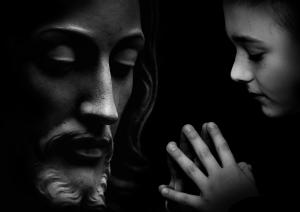
Among the seven sacraments of the Catholic Church, the Eucharist stands as “The fount and apex of the whole Christian life” (Lumen Gentium, no. 11), for in this sacrament is the very body and blood of God incarnate.
There are several ways in which this most unique and remarkable sacrament can be understood. These generally fall within the categories of thanksgiving (the English translation comes from the Greek word “eucharisteo,” which means to give thanks) or sacrifice.
In this paper, I will enumerate three additional ways the Eucharist is significant by placing the sacrament in a temporal or time-related framework.
In the first way, one views the Eucharist as commemorating Christ’s death and Resurrection. Since both of these events are historical, the significance of the Eucharist is predicated on the past. A natural evolution of examining the Eucharist under the auspices of the past is that it emphasizes the sacrificial nature of the Eucharist. This, in turn, stresses the atonement of sins by seeing the Eucharist through the lens of sacrifice.
The need for sacrifice is predicated on the nature of sin. As sin is an act against the will of God, it damages, or even destroys, man’s relationship with God. To repair this relationship in a world made broken and fallen by original sin requires sacrifice.
Evidence of the need for sacrifices to expiate or atone for sins is manifest in the Old Testament. Significantly, these sacrifices almost always involved the spilling of blood. Leviticus 17:11 explains the reason why this is necessary. “Since the life of the flesh is in the blood, and I have given it to you to make atonement on the altar for yourselves, because it is the blood as life that makes atonement.”
Often, atonement involves sacrificing a substitute for the one guilty of sin—the more blameless or blemish-free, the greater the atonement value. Since sin brings death (Romans 6:23), the death of a scapegoat was payment for sin. It wrung life from death. Divine forgiveness became possible through this process. In Christ’s death and Resurrection – which the Eucharist represents – we have the ultimate atonement for sin.
The second manner in which to understand the significance of the Eucharist is to place it in the present tense. This manner of understanding the Eucharist involves a kind of ecclesiastical union. As such, it is frequently called communion, for Catholics are united by it. Additionally, and more importantly, it is in communion that one “communicates” with God.
Communion with Christ is essential for the Catholic spiritual life. This fact is made clear by Christ’s own words. “Abide in me as I abide in you. Just as the branch cannot bear fruit by itself unless it abides in the vine, neither can you unless you abide in me.” (See John 15:4).
In a sense, communion is a process whereby we become like what we eat. While stark and shocking, Jesus’s words illuminate this fact. “Amen, amen, I say to you, unless you eat the flesh of the Son of Man and drink his blood, you do not have life within you. Whoever eats my flesh and drinks my blood has eternal life, and I will raise him on the last day. For my flesh is true food, and my blood is true drink. Whoever eats my flesh and drinks my blood remains in me, and I in him. Just as the living Father sent me and I have life because of the Father, so also the one who feeds on me will have life because of me.” (See John 6:53-58).
This “life” that one obtains through communion is the Divine life. For this reason, Simon Peter writes that the Christian must grow and change so as to become “partakers of the divine nature.” (See 2 Peter 1:4). Put differently, it is through communion that we become little “Christs,” and we begin to see the world through the eyes of grace.
The third and final manner in which the significance of the Eucharist can be understood is by placing it in the future tense. Taken in this context, the Eucharist becomes what is called a viaticum. Viaticum is a Latin term that denotes provisions or supplies one takes for a journey. Within the context of the Catholic Church, viaticum refers to the provisions needed for one’s journey to heaven. Because heaven is when one sees God “face to face,” and because the Eucharist involves communing with God, the Eucharist becomes a foretaste of the beatific vision.
While this threefold categorization of the Eucharist is intended to illuminate various aspects of the sacrament not customarily considered, it must be remembered that these three aspects cannot be conceptually separated from each other without incurring serious errors.
If we limit the Eucharist to a one-time historical event, we risk mistaking the sacrament of possessing a “once saved, always saved” element that it does not have. Instead, we must see partaking of the Eucharist as a life-long process whereby we grow in charity and holiness.
Suppose we reduce the Eucharist to its communion elements. In that case, it loses its significance with regard to the forgiveness of sins and the importance that the Eucharist has on salvation.
Lastly, if the Eucharist becomes only significant when we are ill or near death, we fail to live the rest of our lives as is intended – in communion with God. Additionally, we run the risk of not being prepared for our death.
In this paper, I have endeavored to examine the sacrament of the Eucharist by categorizing it according to time. The Eucharist, as a past event, allows us to see its sacrificial nature. By placing the Eucharist in the present tense, we gain insight into its power to draw us into communion with God. Finally, the Eucharist can be understood as preparing us for our journey to our true home, heaven.













